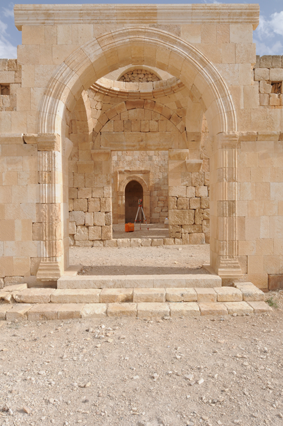Record added successfully


A relatively new approach in the discipline, the archaeology of architecture was at the heart of a recent lecture held as part of the Department of Antiquities’ 100th anniversary festivities at the department’s headquarters in Amman.

Delivering the lecture, titled “Archaeology of Architecture and the Analysis of the Historical Buildings”, Professor Ignacio Arce from the German-Jordanian University said that the new approach manifests itself in not only excavation, but interpretation, restoration and conservation of archaeological sites and buildings.
Arce, who is also the head of the Spanish Archaeological Mission in Jordan, has been excavating, preserving and presenting finds to visitors of the Umayyad Palace and Medina at the Amman Citadel, Qasr Al Hallabat, Hallabat Mosque, Hammam as Sarrah, Qastal, Deir Al Kahf and Qusayr Amra over a span of a few decades.
“One of the problems that archaeologists face is the lack of written historical sources, so the only reliable source is a monument itself,” Arce said, noting that the role of a scholar is to “interrogate” and find the most reliable source for their claims.
“Inscriptions are not the most valuable proof for archaeologists because when writing people tend to lie,” he stressed, adding that “sometimes it’s better to trust the work, not the words”.
Furthermore, archaeological analysis of inscriptions can confirm whether the text is authentic or it was added later, he said.
Arce said that his goal was also to convey the knowledge produced to the local communities by creating visitor centres and site museums as well as training new generations of stone cutters, masons, architects and archaeologists in the field.
“In archaeological stratification, we have a combined series of natural and anthropic deposits,” Arce said, noting that the term archaeology of architecture was first used by Tiziano Manoni in 1990 to describe methods of gaining historical knowledge from building structures, which can eventually be used in architectural heritage conservation.
Moreover, with the archaeology of architecture methodology, integrated by research on written sources, iconographic sources and oral sources, it is possible to gain the construction history of the artefact and the knowledge of the construction technique used in its production, Arce outlined.
“Therefore, stratigraphy provides a relative dating while chrono-typology provides an absolute dating,” the professor said, adding that he implemented some of these techniques at the Amman Citadel, where he worked in 1995.
“Architectural language is like a written language,” Arce said.
--
Source: the Jordan Times.